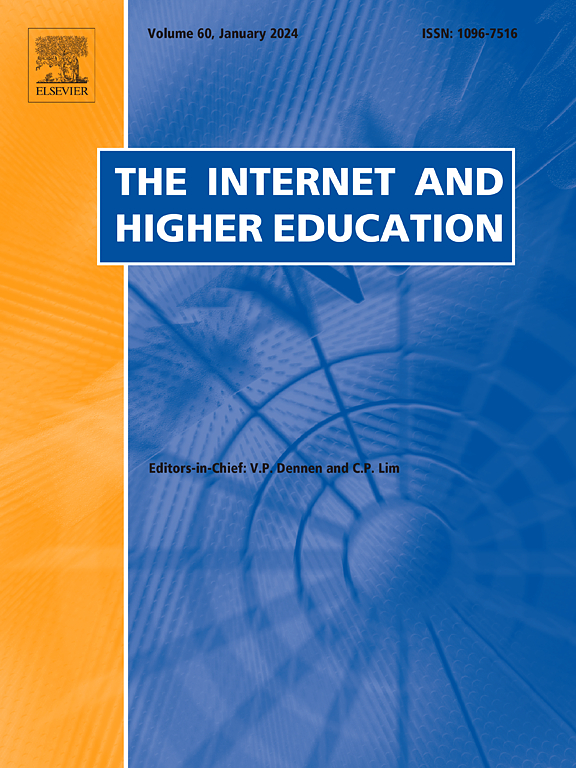Learning from an asynchronous video lecture: Note-taking helps, smartphone sounds harm
IF 6.8
1区 教育学
Q1 EDUCATION & EDUCATIONAL RESEARCH
引用次数: 0
Abstract
Research evidence reveals that note-taking is an effective strategy to learn from video lectures, but also that smartphone noises harm learning. Both these important findings originate from on-site settings, such as in the classroom or lab, however. We therefore decided to address still-open questions about note-taking’s potential beneficial effects and smartphone noises’ potential detrimental effects on learning in an authentic asynchronous online scenario. The present online field experiment involved 196 undergraduate psychology students (144 female; Mage = 23.44 years) who learned from a prerecorded 12-min video lecture on the topic “Learning strategies.” Following a 2 × 2-factorial design, participants did or did not receive a note-taking request before the video lecture (Factor A: note-taking request) and did or did not experience smartphone noises during the video lecture (Factor B: smartphone noises). Participants were asked whether they had actually taken notes. Note-takers (n = 67) reported stronger learning engagement and scored higher on the posttest than the non-note-takers (n = 129). Learning engagement mediated the note-taking effect on learning outcomes. The smartphone noises reduced the learners’ compliance to fulfill the request to take notes. Furthermore, the smartphone noises were detrimental to the learning outcomes of non-note-takers. By contrast, note-takers with and without smartphone noises performed equally well in the posttest. Overall, these findings provide ecologically valid empirical support of two pieces of practical advice for students, namely: how beneficial it is to take notes and how detrimental it is to become distracted by smartphone noises when learning from an asynchronous video lecture.
从异步视频讲座中学习:记笔记有用,智能手机听起来有害
研究证据表明,记笔记是学习视频课程的有效策略,但智能手机的噪音也会损害学习。然而,这两个重要的发现都来自于现场环境,比如教室或实验室。因此,我们决定在真实的异步在线场景中解决关于记笔记的潜在有益影响和智能手机噪音对学习的潜在有害影响的悬而未决的问题。目前的在线现场实验涉及196名心理学本科生(144名女性;法师= 23.44岁),他们从预先录制的12分钟视频讲座中学习,主题是“学习策略”。根据2 × 2因子设计,参与者在视频讲座之前是否收到笔记要求(因素a:笔记要求),以及在视频讲座期间是否经历智能手机噪音(因素B:智能手机噪音)。参与者被问及他们是否真的做了笔记。记录者(n = 67)报告了更强的学习投入,并且在后测中得分高于不记录者(n = 129)。学习投入在笔记对学习成果的影响中起中介作用。智能手机的噪音降低了学习者完成笔记要求的依从性。此外,智能手机的噪音对不记笔记的人的学习效果有害。相比之下,在有和没有智能手机噪音的情况下,记笔记的人在后测中的表现一样好。总的来说,这些发现为学生提供了两项实用建议的生态学上有效的经验支持,即:在学习异步视频课程时,记笔记是多么有益,而被智能手机的噪音分散注意力是多么有害。
本文章由计算机程序翻译,如有差异,请以英文原文为准。
求助全文
约1分钟内获得全文
求助全文
来源期刊

Internet and Higher Education
EDUCATION & EDUCATIONAL RESEARCH-
CiteScore
19.30
自引率
4.70%
发文量
30
审稿时长
40 days
期刊介绍:
The Internet and Higher Education is a quarterly peer-reviewed journal focused on contemporary issues and future trends in online learning, teaching, and administration within post-secondary education. It welcomes contributions from diverse academic disciplines worldwide and provides a platform for theory papers, research studies, critical essays, editorials, reviews, case studies, and social commentary.
 求助内容:
求助内容: 应助结果提醒方式:
应助结果提醒方式:


